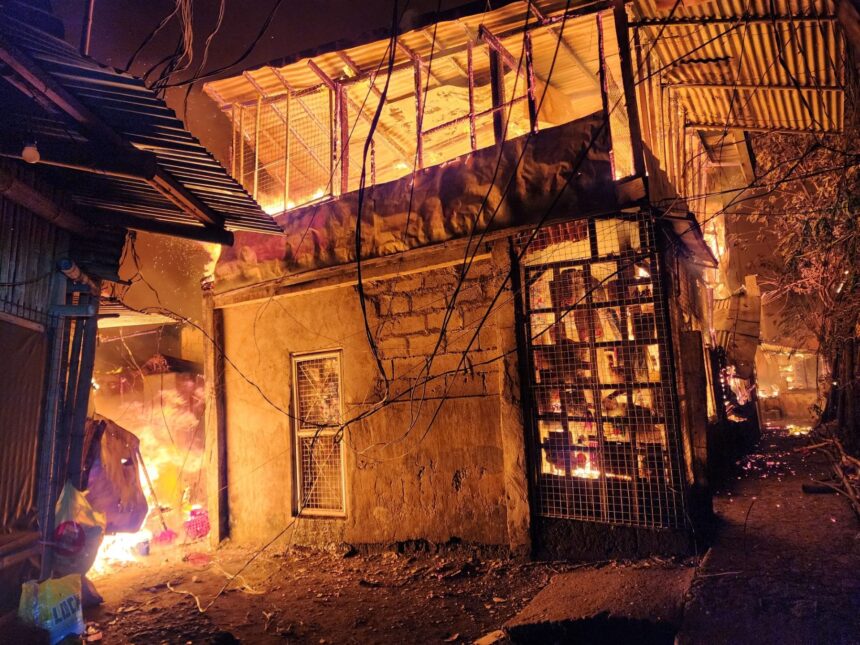On January 28, 2023, residents of the adjacent barangays of West Habog-Habog and San Juan in Molo district, Iloilo City, woke up very early in the morning to furious flames razing their houses to the ground.
A community of urban poor families, the residents’ houses were mostly made of light materials and built so close to each other, making them very susceptible to fire. The people rely mainly on daily, albeit irregular, wage earnings from their work as manicurists, vendors, drivers, laundrywomen, and other odd jobs.
Tovi Mae Deleste of Barangay San Juan and Rosenda Mondido of Barangay West Habog-Habog are two of over a thousand affected individuals by the fire.
Tovi, 23, is a mother to a three-year old girl. She relies on her parents for her and her daughter’s needs. Tovi’s father is a tricycle driver and her mother is also an odd jobber. Tovi recalled that they were awakened by the blaze at around 4 in the morning. She remembered opening her eyes and seeing angry red skies.
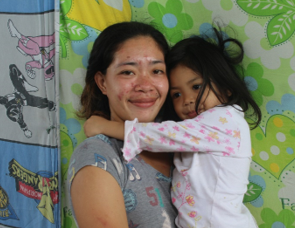
“When we woke up, the fire was already huge. We tried to put out the fire but it was already too late. We hastily grabbed what we could and jumped into the river,” Tovi said. “I was carrying my daughter that time,” she added.
The Deleste family is one of the 97 families which sought refuge inside the evacuation center in Barangay San Juan.
Rosenda, 44, is a mother to nine and a grandmother to five children. Her eldest is now 26 years old, while her youngest is only 6 years old. Her youngest grandchild is a year old. Some of her children no longer live with her as they already have their own families. Some are still studying, one of whom is working while attending school.
Rosenda is a barangay tanod (barangay police officer) while her husband is a construction worker. Aside from being a tanod, Rosenda is also moonlighting as a seller of ready-to-wear (RTW) clothes and necklace holders.
Rosenda recalled that they were on duty the night prior to the fire incident. At around 3 in the morning, Rosenda’s pregnant daughter woke her up to inform her that there was fire.
“When I heard that there was a fire, we hurriedly got up. My husband tried to help the neighbors put out the rapidly spreading fire while I gathered and brought my small children and grandchildren to safety,” said Rosenda. “I told myself that since we are far from the center of the incident, ‘maybe the firefighters will come on time and that the fire won’t get any bigger,’ so we only packed a little,” she reasoned. Rosenda recounted how they fled by running under the bridge since the road was already affected by the fire.
For almost 15 days, Rosenda’s family and the remaining 202 family survivors from Barangay West Habog-Habog stayed inside the Baluarte Elementary School which was designated as an evacuation center.
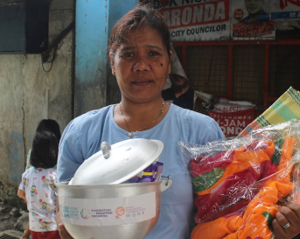
Last March 2, 2023, in time for the observation of the Fire Prevention Month as well as the International Women’s Month, Panay Center for Disaster Response, Inc. (PCDR) and Citizens’ Disaster Response Center Foundation, Inc. (CDRC), through the generous support of the Women’s Global Network for Reproductive Rights (WGNRR) and Foundation for Philippine Progress, Inc. (FPP), successfully delivered assistance to 300 families that survived the fire. The relief packs included cooking pots, sleeping kits, and hygiene/dignity kits.
“We are immensely grateful to everyone who helped us. Even though we lost everything and all hope seems lost, we find strength in your kindness and generosity. We couldn’t do anything about our loss because it already happened. But we desperately want to move on and recover,” said Rosenda with teary eyes.
Tovi also expressed her deep appreciation for the assistance that her family received. “With everything burned and destroyed, we couldn’t thank you enough for your help. You gave us what’s lacking in the past relief deliveries conducted by other organizations: stainless pots and sleeping mats.” As for the diapers that was part of the relief pack that she received because she has a toddler, she shyly commented, “Between food and diapers, of course we’ve always prioritized food. But I am so relieved when I saw that you also gave us diapers for my daughter! With everything seemingly inconvenient or uncomfortable here in the evacuation center, I am glad that at least during the night, I know that my daughter can sleep better wearing a clean and dry diaper. Changing her diaper in the middle of the night will also be so much easier — at least until supply lasts,” she timidly chuckled.
Worries and Uncertainties
A month after the incident, some of the affected families, especially in Barangay San Juan, are still staying in the evacuation center.
“Currently, there are only ten families left here inside the evacuation center,” Tovi said. “We haven’t come back to our place yet because our house is still under construction. It will also be difficult for us because there is no electricity yet. I don’t feel safe,” she added.
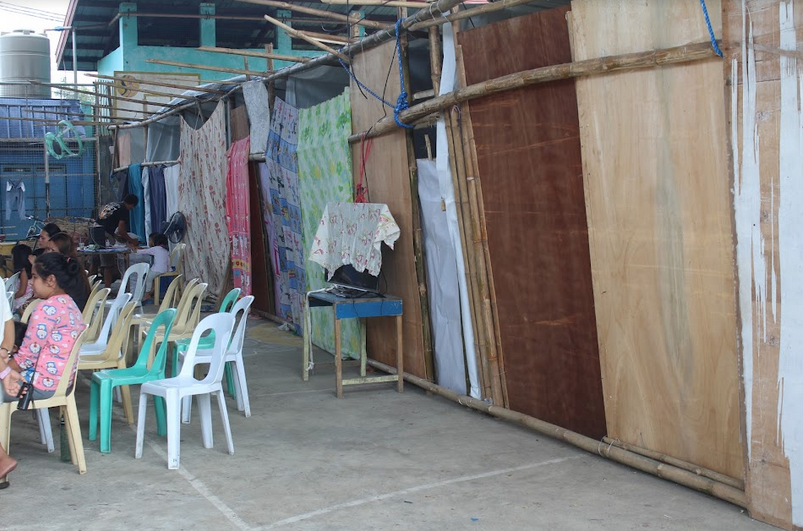
With no electricity and a safe house to return to, women and girls are even more vulnerable and at-risk, especially at night. That is why some families like Tovi’s opted to stay inside the evacuation center.
“There’s a big difference when you’re in your own house — with electricity and secure income or livelihood,” said Tovi.
Meanwhile, other families, like Rosenda’s, returned to their place and set up temporary shelters. Rosenda shared that since the incident happened, the male members of the families have not yet returned to their work as they have become busy with building their transitional housing through the financial assistance given to them, which, Rosenda said, is far from enough.
“Certainty and assurance: that is all we ask for,” Rosenda said in reference to the unclear instructions given to them by the government when they ask about the latter’s relocation plans for them. “Please save us from more headaches because we have endured enough. Since the incident happened, we haven’t moved on yet,” she lamented.
Moreover, Rosenda expressed her apprehension about her children and grandchildren’s health. Although she is truly thankful to the various donors for the food assistance they are receiving, as a mother, she is anxious that consuming canned goods and instant noodles everyday might eventually lead to illnesses of her young wards.
“Sadly, we have no choice at the moment,” Rosenda bewailed. “We have to rely on outside assistance as we currently have no other source of income.”
Mama Class
Among the fire incident survivors from the two barangays are 19 infants aged 0-11 months, 62 children aged 1-3 years, and 57 lactating mothers.
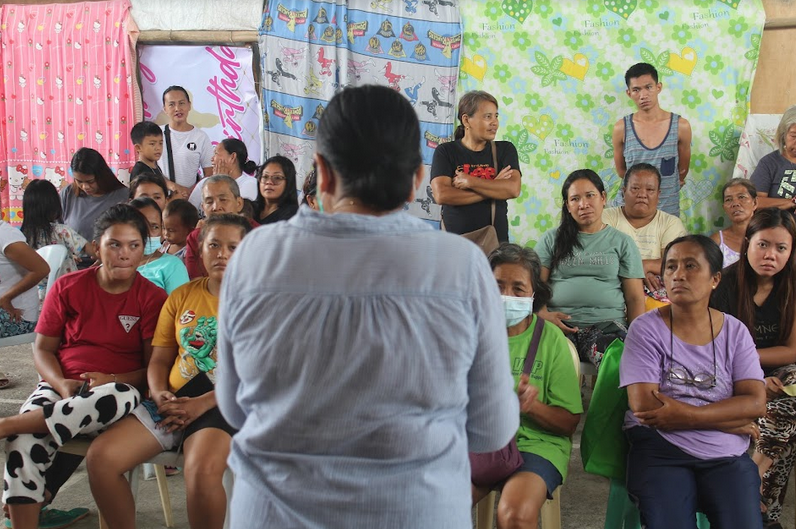
Prior to the distribution proper, PCDR’s Executive Director, Ms. Armie Almero, gave a short orientation on the project, disaster risk reduction and management, and the importance and benefits of breastfeeding, especially in (or despite) the mother and child’s very difficult situation. During the discussion, many participating mothers highlighted the challenges of making healthy food choices to help fuel their milk production.
PCDR also provided fliers on the topic.
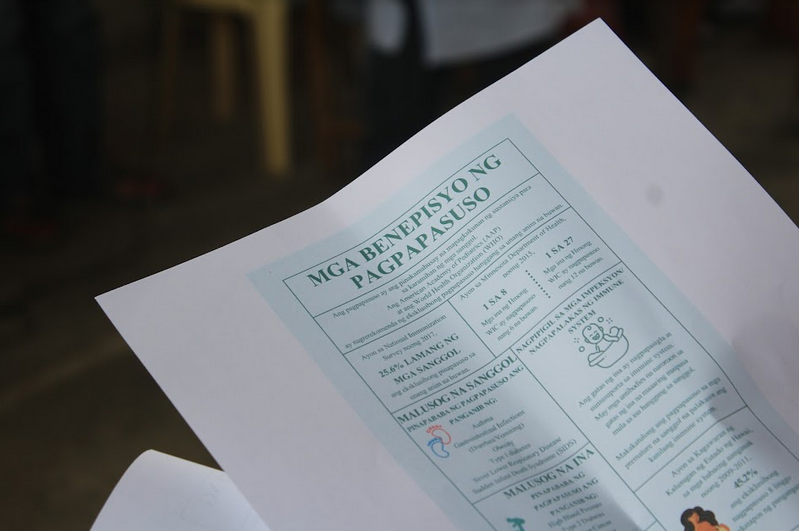
Ms. Almero stressed the importance of the always-relegated-to-the-sidelines sexual and reproductive health and rights (SRHR) of women and girls especially during emergencies. The participants expressed the urgent need for breastfeeding areas and separate restrooms for women and girls so it will be more hygienic and safer for them to use especially when changing their sanitary napkins during their monthly period. These facilities are currently not present inside the evacuation centers. They added that communal restrooms create discomfort and heighten the feeling of insecurity, especially when there are men outside, waiting for their turn to use the facility.
What lies ahead?
As a way forward, PCDR and its Iloilo City partners plan to conduct in the affected communities a training on Community-Based Disaster Management (CBDM), which includes the topic on Evacuation Center Management.
Relocation is still a distant future for the displaced families.
“This is why survivors like me continue to call for support from the government and the private sector. To be able to fully recover, we need financial assistance, housing, and livelihood. We don’t want to live off donors and relief assistance forever. We have stood on our own in the past. Please help us with the resources that we need now and we can be self-reliant once again,” Rosenda concluded.
###

